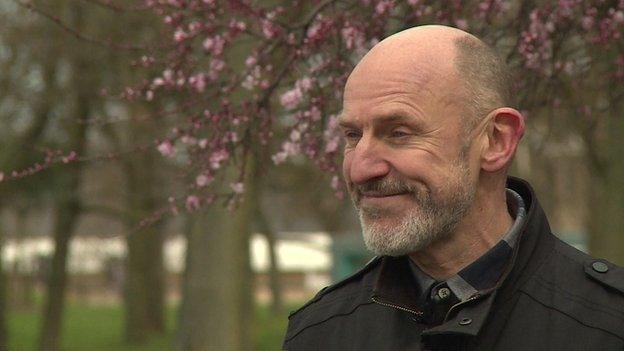Pension withdrawal could mean tax shock, warns IFS
- Published

Bill Miller said he was shocked at the tax he would have to pay when cashing in his pension
Hundreds of thousands of people are being warned about a big tax bill if they decide to cash in their pension pots from next week.
Many people face paying tens of thousands of pounds in income tax, said the Institute for Fiscal Studies (IFS).
From Easter Monday, anyone over the age of 55 will be free to cash in Defined Contribution (DC) pension savings.
But apart from a tax-free lump sum of 25%, they will be liable for income tax on the remainder.
If the sum being taken out - when added to annual income - exceeds £42,386, they will pay tax at the higher rate of 40%.
"Do watch out," said Paul Johnson, director of the independent think-tank IFS.
"If you can keep your income below the higher rate threshold, you're going to end up paying less tax than if you take it in a big lump."
The Treasury, he said, is hoping to benefit to the tune of £0.5bn in 2015/16, partly because some people will be caught in the tax trap.
By 2018/19 it expects to raise an extra £1bn, as a result of people cashing in their pensions.
Tax 'shock'
One of those who was unaware of the full tax implications is Bill Miller, a 61 year-old former local government worker from South London.
He is considering withdrawing the full £125,000 he has saved in his pension.
But since he already has an income of £31,000 from other sources, he faces a one-off tax bill of £43,500.
Even allowing for 25% of his windfall being tax free, he would move into the higher rate tax band. And since his income for the year would be over £124,000, he would also lose all his personal allowance - the amount you can earn before you pay tax.
That is because, under current tax rules, an individual loses a £1 of their personal allowance for every £2 net of tax that they earn above £100,000.
"That's news to me," he told the BBC.
"It's a shock. I've been saving for my pension all these years, and I don't want to lose it. And there's a danger that I could - without realising."
But if Mr Miller were to spread the withdrawals over five years, he would only pay £9,303 in tax, according to calculations by the accountancy firm Blickrothenberg.
Yet many may sympathise with Bill's lack of detailed tax knowledge.
A survey commissioned by Sanlam Wealth Management suggests that 85% of over 55s are unaware they will face any tax bill when liberating their pensions.
A Treasury spokesman pointed out they have consistently stated that 25% of people's pensions is tax free and the rest is taxed at the marginal rate.
Moreover, under the present system, pension withdrawal incurs 55% tax. The Pension Wise website clearly warns of the tax concerns involved, he added.